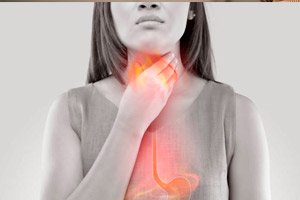
All iLive content is medically reviewed or fact checked to ensure as much factual accuracy as possible.
We have strict sourcing guidelines and only link to reputable media sites, academic research institutions and, whenever possible, medically peer reviewed studies. Note that the numbers in parentheses ([1], [2], etc.) are clickable links to these studies.
If you feel that any of our content is inaccurate, out-of-date, or otherwise questionable, please select it and press Ctrl + Enter.
Study links gastroesophageal reflux disease (GERD) to increased risk factors for cardiovascular disease
Last reviewed: 02.07.2025
 ">
">A recent study published in the Journal of Translational Internal Medicine provides significant data on the impact of gastroesophageal reflux disease (GERD) on cardiovascular health. Using a strict bidirectional Mendelian randomization (MR) design, the researchers found compelling evidence that GERD, traditionally viewed as a digestive disease, can influence key cardiovascular risk factors such as blood pressure, lipid profile, and heart disease risk.
This breakthrough study suggests that the effects of GERD extend beyond the digestive system and may play an important role in cardiovascular health. "Our study highlights that GERD can significantly influence cardiovascular risks, offering a more comprehensive view of its impact," said Qiang Wu, a senior cardiologist at the Sixth Medical Center of China General Military Hospital in Beijing.
The bidirectional Mendelian randomization method has an advantage over traditional studies because it controls for confounding factors and eliminates reverse causality. This approach, which relies on genetic data to make causal inferences, provides a more precise understanding of how GERD may affect cardiovascular outcomes. Genetic variants associated with GERD were used as instrumental variables, allowing the researchers to examine its possible causal role in cardiovascular conditions with high precision, said Qiang Su of Jiangbin Hospital, Guangxi Zhuang Autonomous Region.
The study used a two-sample Mendelian randomization approach using GWAS (genome-wide association studies) data from over 600,000 participants, including 129,000 patients diagnosed with GERD, and cardiovascular disease data from a European cohort of over 200,000 people. The focus was on key blood pressure parameters such as systolic (SBP), diastolic (DBP), pulse pressure (PP) and mean arterial pressure (MAP).
Advanced MR methods were used for the analysis, including inverse variance weighted (IVW) analysis, MR Egger regression, and the weighted median method. These methods controlled for pleiotropic effects (the effect of one gene on several traits), which increased the reliability of the findings. The results showed that GERD may significantly affect cardiovascular risk factors, especially blood pressure and lipid levels.
Key results:
- Elevated blood pressure: Genetically predicted GERD was associated with elevated systolic (β = 0.053, P = 0.036) and diastolic (β = 0.100, P < 0.001) blood pressure, suggesting possible worsening of hypertension, a major risk factor for cardiovascular disease.
- Lipid profile: GERD was associated with elevated levels of low-density lipoprotein (LDL) (β = 0.093, P < 0.001) and triglycerides (β = 0.153, P < 0.001), which increase the risk of cardiovascular disease. A decrease in high-density lipoprotein (HDL) levels (β = -0.115, P = 0.002), which reduces protection against heart disease, was also noted.
- Cardiovascular disease risk: GERD increased the risk of myocardial infarction (odds ratio 1.272, 95% CI: 1.040–1.557, P = 0.019) and hypertension (odds ratio 1.357, 95% CI: 1.222–1.507, P < 0.001). However, no association was found between GERD and heart failure.
Conclusions:
These findings indicate that GERD may be a potential risk factor for cardiovascular disease. "Our study highlights the importance of early diagnosis and preventive strategies for both GERD and cardiovascular disease," said Qiang Su of Jiangbin Hospital.
Significance of the study:
It highlights the need to raise awareness of the potential cardiovascular consequences of GERD. Given the millions of people affected by GERD worldwide, these findings may encourage healthcare professionals to take a more proactive approach to diagnosing and preventing both GERD and related cardiovascular conditions.
